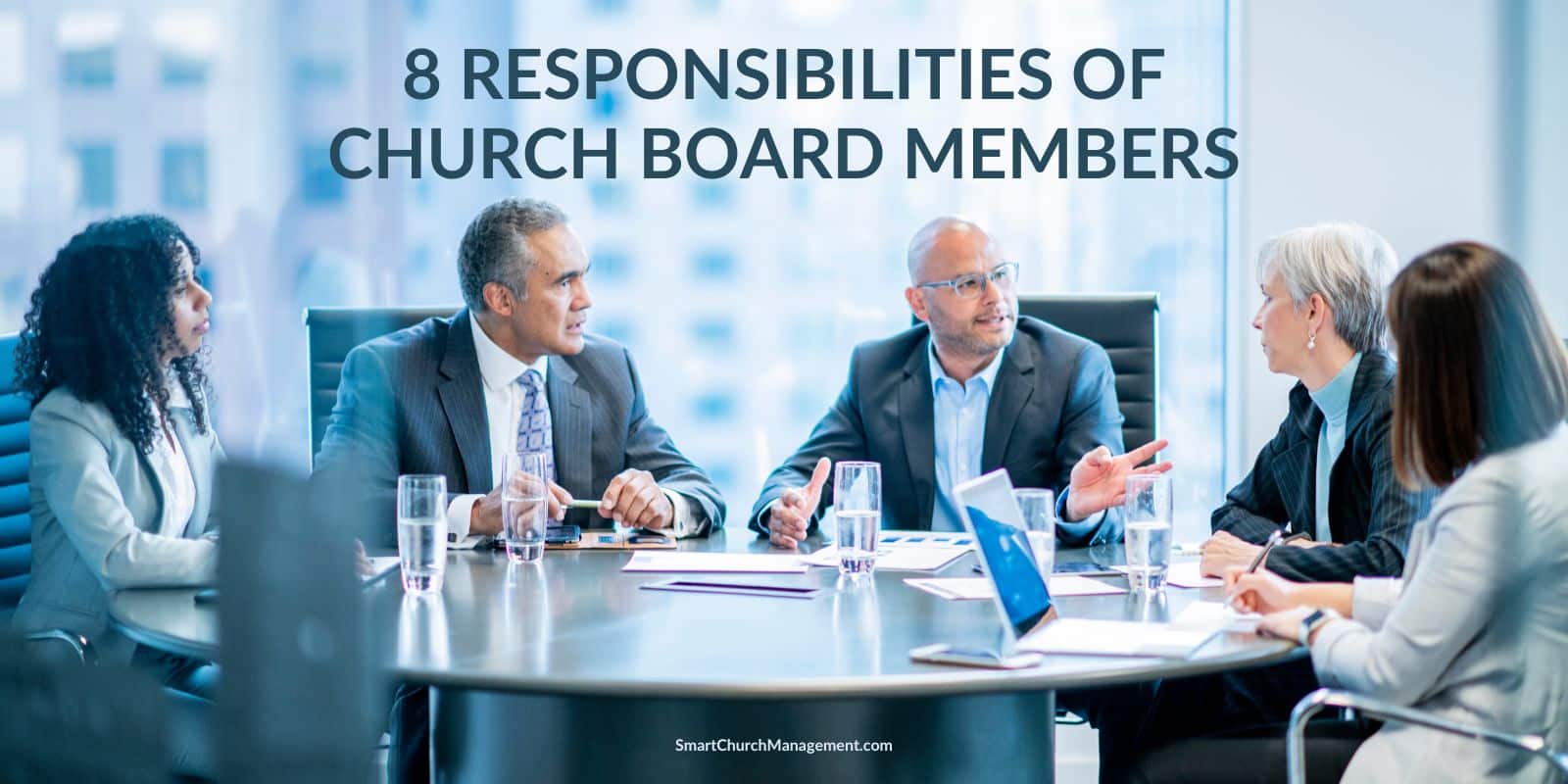Estimated reading time: 5 minutes
Most churches rely on the donations of their members to fund their mission.
Members enjoy a tax deduction for these donations that are freely given to churches that maintain nonprofit status with the IRS.
One of the requirements for maintaining a nonprofit status is to have an oversight board.
Church board responsibilities are many, but the most important is to ensure that the ministry is financially viable and that it fulfills its core mission.
This is achieved by developing a strategy, monitoring performance, and ensuring church financial accountability for the sacrificed donations of its members.
Church boards ensure a meaningful mission is implemented effectively.
Effective boards have a significant impact on the long-term viability of the organization and have a vested interest in how well the church implements its strategy for achieving its mission.
This is done by meeting regularly while actively overseeing the key operational functions – which are church budget oversight, top leader performance evaluation, strategic performance management, and legal compliance.
8 Church Board Responsibilities
1. Strategic Planning
The board is responsible for articulating the church’s core mission and developing a strategy and plan to achieve it.
This is done by going through a formal strategic planning process.
Develop a mission, vision, and values statement, along with operational goals that outline the specific steps required to achieve the mission.
Delegate those goals to specific departments of the church.
For instance, if the church has an objective to create outreach programs for its community, write actionable goals and delegate those responsibilities to someone.
Then, hold them accountable for getting it done.
2. Managing Performance
The board is responsible for monitoring and holding leadership accountable for doing their job.
This is done by developing annual church goals, delegating that responsibility to leadership, and then monitoring the progress.
Demonstrate support by delegating decision-making and establishing clear boundaries for achieving those goals.
For example, the Executive Pastor should understand the boundaries of his authority for making tactical decisions about the day-to-day operations of the ministry.
This decision-making authority removes decision bottlenecks that can hinder the progress toward achieving a goal.
3. Financial Oversight
The board oversees and ensures there is responsible stewardship of church resources and that it maintains financial accountability and solvency.
This is done by approving and overseeing the annual church budget.

Provide input and direction on strategy and prioritize spending to ensure that the strategy has the necessary financial resources to support it.
Financial oversight includes identifying independent outside auditors to perform occasional audits to safeguard against embezzlement, ensure good business practices, and maintain compliance with state and federal laws.
4. Managing Compensation
This committee is responsible for benchmarking the compensation of top church leaders, making recommendations for pay and housing allowances, and approving the salaries of senior leadership.
This may include chartering a personnel committee to make recommendations on pay policy and employee salary ranges.
5. Ensure Legal Compliance
Church boards are responsible for adhering to laws that govern nonprofit organizations.
This includes the duties of care, loyalty, and obedience.
The board has a responsibility to ensure that the church stays true to its core mission by participating in decision-making, using good judgment, setting aside personal interests to ensure the best interests of the organization are kept, and complying with governing laws.
6. Monitor Conflict-of-Interest
The board is responsible for ensuring that there are no conflicts of interest and for implementing policies and systems to provide full disclosure of any potential conflicts between outside organizations and church employees or the board.
For instance, if a church board member owns a painting company, there could be a potential conflict if that company is given preferential treatment for outsourced painting jobs.
Do this by creating a conflict of interest policy that requires employees and board members to disclose potential conflicts and sign a conflict of interest statement.
7. Maintain Supporting Documents and Board Records
The board is responsible for ensuring all board records are kept, including:
- board minutes
- mission, vision, values statement,
- church bylaws,
- articles of incorporation
- and any policies that govern the board’s function.
Manage these documents by housing them on secure servers and controlled file cabinets.
8. Board Training
Help new board members by providing the appropriate orientation and training for their roles.
This includes a review of all corporate documents, job descriptions, and responsibilities.
Also, orient them to understand the legal requirements for board members. There are many church board training resources that can help.
Anyone chosen to serve on a church board should recognize the honor and incredible responsibility that comes with that role.
Having a good understanding of role responsibilities, coupled with thorough training, is a great way to get a board member equipped to serve the church.
Some great books for your reading library include High-Impact Church Boards: How to Develop Healthy, Intentional, and Empowered Church Leaders and Good Governance for Nonprofits: Developing Principles and Policies for an Effective Board.
If you are a member of SCM, you can log in to your account here to access an editable example of a board member’s job description.
If you are not a member and would like access to an example board member job description, you can learn more here.



